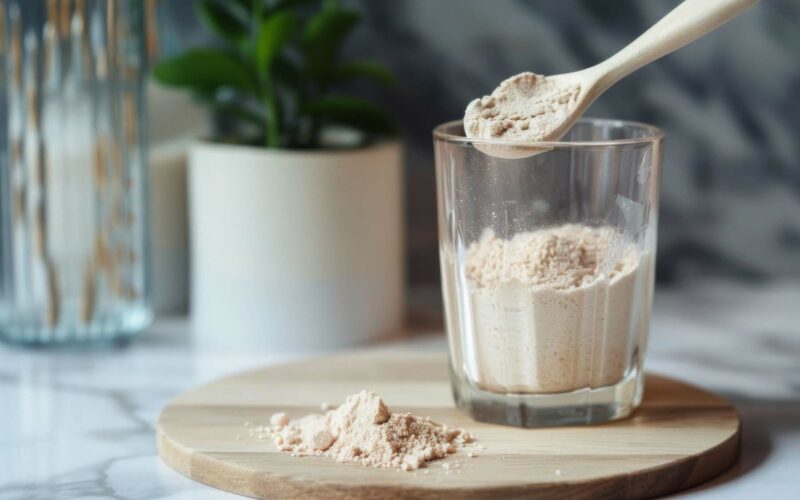Choosing the right type of creatine can be a real puzzle, especially for those on a plant-based (vegan) diet. But fear not. We’re going to tackle all those questions about vegan creatine, its benefits, and how it can help supercharge your workout routine. Whether you are a seasoned vegan athlete or just starting out on your journey, you’ll learn everything you need to know about vegan creatine and how it can help you build muscle, improve your performance, and take your fitness journey to the next level.
Table Of Contents
- Is Vegan Creatine Right For Me?
- Debunking Veganism: Do Vegans Really Need Creatine?
- Unlocking Your Potential: Benefits of Vegan Creatine
- Different Types of Vegan Creatine
- Navigating The Supplement Aisle: Choosing the Best Vegan Creatine
- Maximize Your Results: How to Take Vegan Creatine
- Conclusion
Is Vegan Creatine Right For Me?
You might be wondering, “If creatine is naturally found in animal products, does that mean I’m missing out?”. Research backs that up, showing that vegans tend to have lower levels of creatine in their muscles. One study found that when people significantly reduced animal products in their diets, such as meat and fish, their muscle creatine levels decreased.
But that’s where vegan creatine comes in. Vegan creatine is not extracted from animals. It’s made by combining two vegan-friendly sources, sarcosine and cyanamide. These create creatine monohydrate, a synthetic version that is chemically identical to the naturally occurring form.
Think of it as a supplement to support your muscles. It helps you maintain those crucial creatine stores in your muscles. This means you can still enjoy all the awesome benefits of creatine even on a plant-based diet.
Debunking Veganism: Do Vegans Really Need Creatine?
The simple answer? Yes, but let’s explore why. Research suggests that folks following a vegan diet often have lower creatine levels due to the absence of animal-based foods. You need creatine to fuel your muscles during those intense workouts. If your creatine levels are low, your body might struggle to keep up, especially during high-intensity activities.
Think of creatine like the fuel in your car; the more you have, the further you can go. Vegan creatine helps you fill your tank so you can push harder and longer.
Unlocking Your Potential: Benefits of Vegan Creatine
Now, you might be thinking, “That’s cool, but how does it actually help *me*?”. Supplementing with vegan creatine helps your body create ATP, the primary energy source of our cells. More ATP equals more energy to power through your workouts. Imagine finally conquering those extra reps you’ve been aiming for or shaving seconds off your personal best.
But that’s not all. Vegan creatine can even boost your cognitive function. A recent study published in 2023 discovered that creatine supplementation might enhance brain function. This means that vegan creatine could potentially contribute to sharper thinking, improved memory, and better focus. Talk about a win-win.
Different Types of Vegan Creatine
Vegan creatine is available in various forms. Let’s explore:
Creatine Monohydrate
- The OG: Creatine monohydrate has been the go-to form for years, backed by tons of research.
- Tried and true: Numerous studies prove it’s effective in increasing muscle mass, enhancing strength, and boosting exercise performance. Studies even suggest folks who supplement with creatine could double their muscle growth compared to those who don’t. How amazing is that?
Creatine HCl
- The Dissolver: This form is known for its superior solubility compared to monohydrate. Fewer gritty drinks mean a happier workout experience.
- Similar results: One study indicated that creatine nitrate is a more soluble alternative. Research shows its benefits resemble monohydrate.
Creatine Ethyl Ester
- The Newbie: This newcomer to the scene needs more research to confirm if it lives up to the hype.
- Room for growth: While it claims faster absorption, studies suggest it’s less effective for boosting muscle strength and body composition than monohydrate. This might not be your best bet.
Creatine Citrate
- The Jury’s Still Out: Research on creatine citrate is mixed.
- Seeking confirmation: Although some findings suggest comparable effectiveness to monohydrate, more studies are needed to understand its impact fully.
Navigating The Supplement Aisle: Choosing the Best Vegan Creatine
It’s crucial to make sure your creatine supplement aligns with your dietary needs. It’s worth mentioning that most creatine, whether vegan or not, is generally synthetic.
This means there’s a good chance your current supplement is already vegan. But to be extra cautious, here are a few key points when shopping for vegan creatine.
- Label check: Scan the ingredient list for hidden animal-derived additives like gelatin. Always double-check if you’re unsure about an ingredient.
- Certification search: Seek vegan certifications. Certifications offer extra peace of mind that what you’re getting aligns with your values.
- Reputable brands: Opt for reputable brands that prioritize quality and transparency.
Maximize Your Results: How to Take Vegan Creatine
The optimal way is by using a “loading” and “maintenance” phase. Research suggests an effective way to incorporate creatine is through two phases: loading and maintenance. Don’t worry, it’s simpler than it sounds.
- Loading: Take 20 grams daily for the first 5–7 days. This jumpstarts the saturation process. You can split this dosage throughout the day.
- Maintenance: After the loading phase, take a consistent dose of 3–5 grams daily.
Consistency is key. It might take a few weeks to experience noticeable results. The effects build up over time. Listen to your body and adjust accordingly.
Conclusion
Vegan creatine is a fantastic way to make sure you’re giving your body the best chance to perform at its peak. Whether you want to push harder in the gym, recover quicker, or even gain a cognitive edge, vegan creatine is a safe and effective way to level up. With the right knowledge and the best vegan creatine, you’re well on your way to unlocking your full athletic potential.

